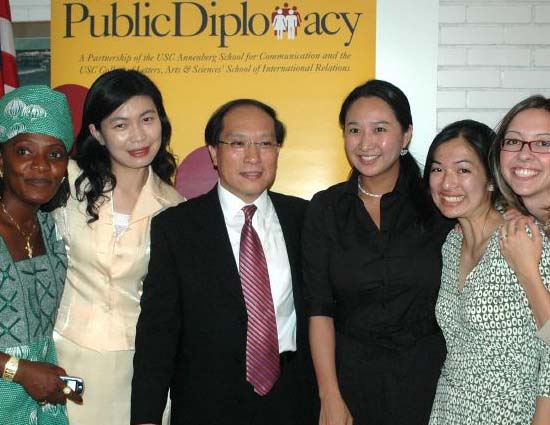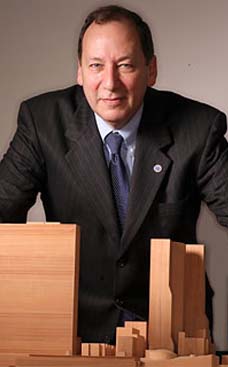
Glassman's key realization is that the United States can't always find perfect friends. Supporting reformers who favor liberal ideals sometimes means supporting—though "not endorsing," says Glassman—activists who vehemently disagree with America on some points. His office recently brought an Egyptian journalist, for example, to New York for a conference, even though the reporter denounces U.S. support for President Hosni Mubarak and works closely with the Muslim Brotherhood. That would have been anathema to Karen Hughes and her predecessors, who placed a premium on loyalty. Glassman wants to "bring people in contact with America," he says, not to "tell them what to think." Glassman would like to shift his office's $900 million budget away from "messaging," but change is coming slowly. There are only eight people engaging foreign Web sites, when Glassman says he needs 800, and he has recruited companies and foundations to help with funding. Dole, the pineapple giant, now helps the State Department teach English in the Philippines, where the company has a large presence. Because Glassman's approach is "not yet institutionalized," there's a danger a new appointee might reverse it, says another senior State Department official. That would be a shame, because Obama needs a light touch in public diplomacy.
Unlike his failed predecessors, Glassman has finally figured out how to sell the American idea abroad
How to Sell America
Washington's head of public diplomacy is one Bush official Obama would do very well to keep.
By Adam B. Kushner | NEWSWEEK
Published Jan 3, 2009
Photo: DSC_8600 by California Em Flickr Creative Commons Attribution 2.0 Generic
James K. Glassman, as they say in Washington, gets it. The under secretary of state for public diplomacy has been on the job for only six months, but he has already scored small successes in the U.S. effort to win over "hearts and minds" in the Muslim world, a hard sell if ever there was one. Glassman has largely shelved the strategy of his predecessor, Karen Hughes, another onetime journalist, who waged this battle as an ad campaign, flooding the unreceptive market with positive "messages" about the United States. Glassman is out to halt radicalism, and he is fighting the war of ideas in small and diverse ways: private-sector partnerships to teach English; conferences where liberals from around the world can swap ideas; social networks on the Internet that teach the virtues of democracy by rewarding the best Web video on the subject. Glassman has "been very strong," says a senior State Department official who didn't want to be quoted knocking Hughes.
Unlike his failed predecessors, Glassman has finally figured out how to sell the American idea abroad. Washington insiders see him as an intellectual cousin of Defense Secretary Robert Gates, who has said that "we know we cannot kill or capture our way to victory." And President-elect Obama would be smart to keep Glassman, as he kept Gates, because he needs a subtle hand in this tricky post.
Gone are the days when public diplomacy meant countering Soviet propaganda with the American version. After the Cold War, the State Department shifted to image making. Hughes, Bush's campaign confidante, was picked to run the Office of Public Diplomacy in 2005 and ran it like a campaign, "trying to broadcast positive messages about the United States," says Matthew Waxman, deputy director of the State Department's Policy Planning department from 2005 to 2007. Her people blasted a daily two-page memo with talking points to U.S. diplomats. In one memorable debacle, she was heckled by Saudi women who resented her assumption that they wanted U.S.-style freedoms.
Glassman was not known for subtlety before he took this job. As a journalist he was most famous for predicting at the height of the dotcom bubble that the Dow would reach 36,000. Yet in his new post he has dropped the hype and decided that the best way to sell American values is to let others do it for him. Instead of lecturing Colombian liberals about the shortcomings of the FARC, he silently supported Oscar Morales, who started a Facebook group against terrorism that drew more than a million protesters to the streets of Bogotá. "I think that's a very important lesson," says Glassman. "Even when people are doing the kinds of things that we want them to be doing, if we get too deeply involved it tends to be counterproductive."
Glassman's key realization is that the United States can't always find perfect friends. Supporting reformers who favor liberal ideals sometimes means supporting—though "not endorsing," says Glassman—activists who vehemently disagree with America on some points. His office recently brought an Egyptian journalist, for example, to New York for a conference, even though the reporter denounces U.S. support for President Hosni Mubarak and works closely with the Muslim Brotherhood. That would have been anathema to Karen Hughes and her predecessors, who placed a premium on loyalty. Glassman wants to "bring people in contact with America," he says, not to "tell them what to think."
To that end, he is funding a private, faith-based Muslim program to convert Pakistani madrassas from extremist breeding grounds into proper schools. He has pushed the Kuwait embassy to recruit local law students for moot-court arguments about Guantánamo Bay. And he has used social-networking sites like Twitter and Second Life to reach out to Arabic speakers. The idea is to prevent the 60 percent of the Muslim world that's under 30 from turning to radical anti-American ideologies.
Glassman has also deployed surrogates to blogs, chat rooms and message boards where—in Urdu, Farsi, Arabic and Russian—they identify themselves as State Department representatives and gently correct distortions. One Glassman proxy recently debated Mahmoud Ahmadinejad's media adviser at length on the adviser's Web site. The debate was reprinted in Iranian newspapers.
Glassman would like to shift his office's $900 million budget away from "messaging," but change is coming slowly. There are only eight people engaging foreign Web sites, when Glassman says he needs 800, and he has recruited companies and foundations to help with funding. Dole, the pineapple giant, now helps the State Department teach English in the Philippines, where the company has a large presence. Because Glassman's approach is "not yet institutionalized," there's a danger a new appointee might reverse it, says another senior State Department official. That would be a shame, because Obama needs a light touch in public diplomacy.
With Michael Miller in New York













